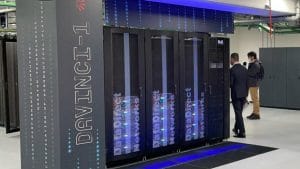
LEONARDO AS HPC USER
In the EuroCC project, Leonardo participates as a third party in the Italian National Competence Center EuroCC-Italy.
Leonardo leverages the competences learned with the Davinci-1 HPC to provide support and training to companies in Italy and, in particular, in the Liguria region.
HPC is a central support infrastructure to improve the business of all kinds of companies, from the small SME that changes and speeds up its algorithms, to the large company that manages to improve existing processes and create fertile ground for the creation of completely innovative solutions.
Considering the wide portfolio of products and services built and developed by Leonardo, HPC has proven to be useful in different scenarios and different sectors. The function of HPC is twofold:
- it makes available large proprietary computing power, removing limits on the processing power used by internally developed algorithms and codes;
- it allows centralized computing capacity for the entire company to make the most of the expertise of engineers and researchers.
Within the company, HPC and cloud computing have allowed to design and develop innovative solutions in the fields of Big Data, Artificial Intelligence, Simulation of complex systems and Optimization of parallel code. One of the main aspects Leonardo will focus on in the coming years thanks to HPC technology is the “Digital Twin“.

The availability of an accurate and predictive virtual twin of the processes within Leonardo is also fundamental to predict the effect of a change of state, intended or unintended (e.g. due to altered environmental conditions), to avoid malfunctions, to reduce production and operating costs, by virtue of preventive actions, to make what if evaluations, to train operators, etc…
The main element in developing a digital twin are:
- Software, so a special function is required that describes the internal state of the system and keeps all components synchronized
- Data, which may be collected from sensors or simulated
- Numerical models with which to simulate the behavior of the various system components.
In order for a Digital Twin to be realized, it requires large amounts of data, an adequate computational infrastructure, specific software and, above all, transversal competences, ranging from the real system expert, to the process and design engineer, to the computer scientist for software writing and data management, to the mathematician or physicist for models, to the computational infrastructure expert.
This innovation is enabled within Leonardo by the davinci-1 HPC, which enables the computational power needed to develop and execute the software, manage and process the massive amount of data,
and compute the solutions to the various mathematical and artificial intelligence models needed to create the digital twin.
To find out more, visit EuroCC Italy website and download the full article!